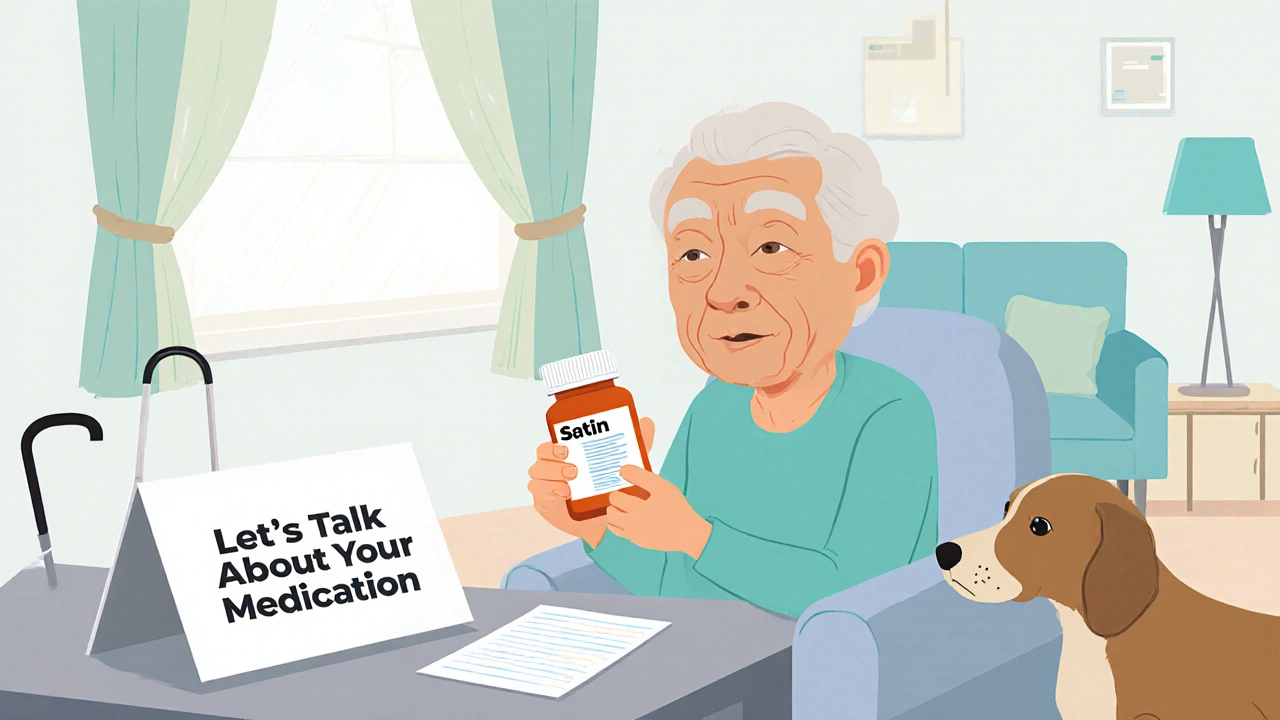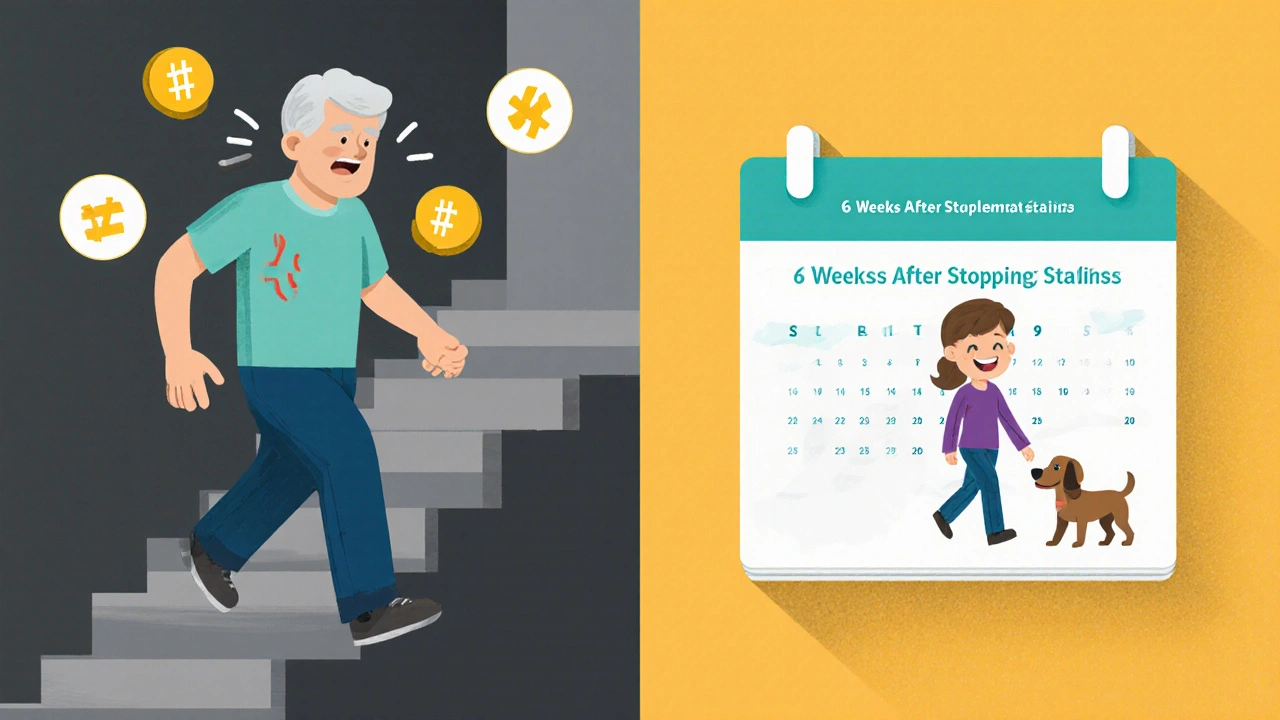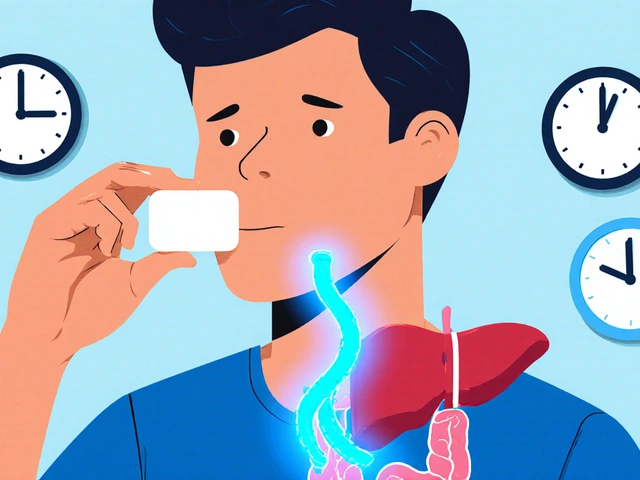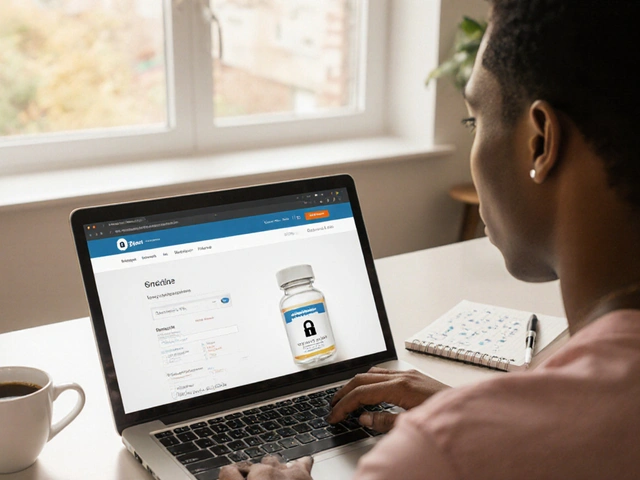
Statin Discontinuation Decision Tool
Assess Your Statin Discontinuation Suitability
This tool helps determine if discontinuing statins might be appropriate based on your health profile. Always consult your doctor before making changes to your medication.
Many people take statins for years without thinking twice. But what happens when the reasons for taking them change? Maybe you’re older now. Maybe you’re dealing with new health issues. Or maybe the muscle aches, fatigue, or brain fog have become too much to ignore. The truth is, statin discontinuation isn’t a failure-it’s sometimes the smartest choice you can make. The question isn’t whether you should stop, but when and how to do it safely.
Why Do People Stop Statins?
Nearly one in five people who start statins stop taking them for at least a year. That’s not because they’re ignoring their doctor’s advice-it’s because they’re responding to real experiences. The most common reason? Muscle pain. Not everyone gets it, but for those who do, it can feel like constant soreness, weakness, or cramps that don’t go away. Some people report trouble climbing stairs, carrying groceries, or even walking their dog. These aren’t just minor complaints-they impact daily life. Fear also plays a big role. Many worry about developing type 2 diabetes, liver damage, or memory loss. While studies show these risks are small for most, the anxiety sticks. And when side effects show up, patients often assume the statin is the culprit-even if it’s not. That’s why so many stop without talking to their doctor first. Hospital stays, moving to a nursing home, or a new cancer diagnosis also trigger statin discontinuation. In fact, patients admitted to the hospital are over three times more likely to stop statins. Sometimes it’s the doctors who pull the plug. Other times, it’s the patient. Either way, the decision often happens in the chaos of a medical crisis, not in a calm, thoughtful conversation.When Is It Safe to Stop?
Not everyone who stops statins is at risk. The key is understanding your situation. For people with existing heart disease-like those who’ve had a heart attack, stroke, or stent-stopping statins is dangerous. One study found that for every 77 people who stopped statins after a heart event, one more had another major cardiovascular problem each year. That’s a real, measurable risk. But for older adults with no history of heart disease, the story changes. If you’re 75 or older, have multiple chronic conditions, and a life expectancy under two years, continuing statins may do more harm than good. You’re not gaining years-you’re gaining pills, side effects, and stress. The American Geriatrics Society and other experts agree: in these cases, stopping statins is not just safe-it’s appropriate. The same applies to people in hospice care. If you’re weeks from the end of life, statins won’t help you live longer. They might even make you feel worse. A 2024 review of studies found no increase in death risk after stopping statins in end-of-life patients. That’s powerful evidence. If your goal is comfort, not longevity, statins are often unnecessary.What Happens When You Stop?
Stopping statins doesn’t mean your cholesterol instantly spikes back to dangerous levels. Cholesterol levels rise gradually, usually over weeks to months. But here’s the catch: the benefit of statins isn’t just about lowering cholesterol-it’s about stabilizing plaque in your arteries. That effect fades faster than the cholesterol number. So even if your numbers look okay after stopping, your risk can climb quickly. For people with heart disease, stopping statins can lead to plaque rupture, triggering a heart attack or stroke. That’s why restarting statins after stopping is harder than continuing them in the first place. About 43% of people who stop do eventually restart, often after a scare. But many don’t. And that’s where the danger lies. For healthy older adults without heart disease, stopping statins doesn’t cause immediate harm. In fact, some report feeling better-more energy, less pain, clearer thinking. The big question is whether that short-term gain leads to long-term risk. That’s exactly what a major trial in Switzerland, France, and the Netherlands is trying to answer. The trial, called Discontinuing Statins in Multimorbid Older Adults, is tracking 1,800 people over two years to see if stopping statins increases heart events or death. Results are expected in late 2025.
How to Stop Statins Safely
Never stop statins cold turkey unless your doctor tells you to. Abruptly stopping can cause a rebound effect-your body may overproduce cholesterol, and plaque can become unstable. Instead, work with your doctor to make a plan. Start with a conversation. Ask: “Is this medicine still helping me?” and “What are the risks if I stop?” Don’t assume your statin is still necessary just because you’ve been on it for years. Your health has changed. Your needs have changed. If you’re stopping because of side effects, try alternatives first. Switch to a different statin-rosuvastatin or pravastatin are often better tolerated. Lower the dose. Try taking it every other day. Some people find intermittent dosing reduces muscle pain without losing protection. If those don’t work, non-statin options exist. Ezetimibe lowers cholesterol by blocking absorption in the gut. PCSK9 inhibitors are injectables that dramatically cut LDL, but they’re expensive. Fibrates and omega-3s help with triglycerides but don’t offer the same plaque-stabilizing benefits as statins. If you decide to stop completely, do it gradually. Reduce the dose over 4-6 weeks. Monitor for symptoms like chest pain, shortness of breath, or unusual fatigue. Get a lipid panel done 6-8 weeks after stopping. Don’t skip follow-up-this is when your risk starts to shift.What to Do After Stopping
Stopping statins doesn’t mean you stop caring about your heart. Lifestyle still matters. Eat more vegetables, legumes, whole grains, and nuts. Move daily-even a 20-minute walk helps. Control blood pressure and blood sugar. Quit smoking if you still do. These habits don’t replace statins, but they reduce your risk. If you’re over 65 and have high cholesterol but no heart disease, your doctor might recommend a coronary calcium scan. This non-invasive test shows how much plaque is already in your arteries. If the score is zero, your risk is very low. If it’s high, you might still benefit from statins-even if you’re older. Keep track of how you feel. If your muscle pain disappears after stopping, that’s a win. But if you start having chest discomfort or dizziness, tell your doctor right away. Don’t wait. Your body is telling you something.
Common Myths About Stopping Statins
- Myth: “I’ll have a heart attack if I stop.”
Truth: Only if you have existing heart disease and stop without a plan. For healthy older adults, the risk is much lower. - Myth: “Statins are lifelong.”
Truth: No guideline says you must take them forever. Treatment should be reviewed regularly-especially as you age. - Myth: “My doctor never brings it up.”
Truth: Most doctors don’t initiate deprescribing conversations. You have to ask. Be the one to start the discussion. - Myth: “Stopping means I’m giving up.”
Truth: It means you’re choosing quality of life over unnecessary medication. That’s not giving up-it’s taking control.
Who Should Talk to Their Doctor About Stopping?
You should have this conversation if you:- Are 75 or older with no history of heart attack, stroke, or stent
- Have multiple chronic illnesses (like kidney disease, dementia, or cancer)
- Have a life expectancy under two years
- Are experiencing muscle pain, fatigue, or cognitive changes you think are linked to statins
- Are in hospice or receiving palliative care
- Feel overwhelmed by the number of pills you take every day
Final Thoughts
Statins save lives. But they’re not magic pills. They’re tools. And like any tool, they’re only useful if they fit the job. For someone with advanced cancer and a few months to live, statins are the wrong tool. For someone with a blocked artery and a 20-year life expectancy, they’re essential. The goal isn’t to stop statins-it’s to make sure you’re only taking what you need. That’s what good medicine looks like: personalized, thoughtful, and focused on what matters most to you.Can I stop statins on my own?
No. Stopping statins without medical guidance can increase your risk of heart attack or stroke, especially if you have existing heart disease. Always talk to your doctor first. They can help you decide if stopping is right for you and how to do it safely.
Do statins cause long-term damage?
Statins are generally safe for long-term use. Serious side effects like liver damage or muscle breakdown (rhabdomyolysis) are rare. Most side effects-like muscle aches or mild liver enzyme changes-are reversible when you stop the drug. There’s no evidence statins cause permanent harm in healthy people.
What if I stop and my cholesterol goes up?
Cholesterol levels will rise after stopping statins, usually within a few weeks. But high cholesterol alone doesn’t mean you’re at high risk. What matters more is whether you have plaque buildup in your arteries. A coronary calcium scan can help clarify your true risk level after stopping.
Are there natural ways to replace statins?
Diet, exercise, and weight loss can lower cholesterol, but they don’t replace the plaque-stabilizing effects of statins in people with heart disease. Supplements like red yeast rice contain natural statin-like compounds and carry similar risks. Don’t rely on them as a substitute without medical advice.
How often should statin use be reviewed?
Statins should be reviewed at least once a year, especially after age 75 or if your health changes. Your risk profile isn’t static. What made sense at 60 might not make sense at 80. Regular check-ins help ensure your treatment still matches your goals.
If you’re considering stopping statins, start by writing down your reasons. Then schedule a visit with your doctor-not to argue, but to understand. You deserve a treatment plan that fits your life, not one that just follows a protocol.




swatantra kumar
November 19, 2025 AT 15:44Statins are just another Big Pharma scam to keep old folks docile and pill-popping. I stopped mine after my yoga instructor said cholesterol isn’t even the real villain- inflammation is. Now I eat turmeric like candy and feel like a 30-year-old again. 🌿💪
Brianna Groleau
November 21, 2025 AT 12:05I just turned 78 and have been on statins since I was 62 after a mild scare. But lately, I can’t climb my porch steps without feeling like my legs are made of wet cement. I didn’t stop on my own-I sat down with my doctor and said, ‘I don’t want to live longer if I can’t walk to the mailbox without groaning.’ He nodded, we lowered the dose, then stopped. I sleep better. I laugh more. And no, I haven’t dropped dead. Turns out, life isn’t a cholesterol number. It’s the smell of coffee in the morning and the dog nudging your hand for pets.
Bill Camp
November 22, 2025 AT 15:38Anyone who thinks statins are harmless is either a cardiologist with a consulting contract or someone who’s never had muscle pain that makes you cry while brushing your teeth. I stopped cold turkey after 12 years. My CPK levels were through the roof. I didn’t need a doctor to tell me-my body screamed. Now I walk 5 miles a day. My LDL is 140. So what? I can carry my own groceries. That’s worth more than a lab result.
rob lafata
November 24, 2025 AT 13:37Let me cut through the woke medical fluff: if you’re over 75 and haven’t had a heart attack, you’re not ‘at risk’-you’re just old. Statins are a geriatric trap. The guidelines were written by men in suits who’ve never had to pay for their own meds. You think your ‘plaque stability’ matters when you’re 80 and can’t remember your grandkid’s name? You’re not a statistic-you’re a human. Stop the pills. Eat real food. Walk. Breathe. The system wants you docile. Don’t be.
Nick Naylor
November 25, 2025 AT 23:47Let’s be clear: statins are not optional for anyone with a history of cardiovascular events. The data is irrefutable. The 77:1 NNT is not a suggestion-it’s a survival imperative. To suggest discontinuation in high-risk populations without rigorous risk stratification is not just irresponsible-it’s medically negligent. The American Heart Association guidelines are clear: primary prevention in the elderly is nuanced, but secondary prevention is non-negotiable. This article dangerously conflates risk categories. It’s not about ‘quality of life’-it’s about preventing myocardial infarction, stroke, and death. Period.
serge jane
November 27, 2025 AT 10:04What’s the point of living longer if every day is a checklist of pills and pain? I’ve seen my father take 14 medications a day. He can’t feel his toes. He can’t remember his wife’s birthday. But his LDL is 82. So what? Medicine has forgotten that healing isn’t about numbers. It’s about presence. About being able to sit on the porch and watch the birds. Statins aren’t the enemy. But blind adherence? That’s the disease.
robert cardy solano
November 28, 2025 AT 18:42My dad stopped statins at 82. Didn’t tell anyone. Just quit. Two years later he’s still gardening, playing chess, and yelling at the TV during baseball games. His cholesterol? Up. His mood? Better. His doctor? Didn’t notice until his annual visit. Sometimes the body knows what the algorithm doesn’t.
Sarah Swiatek
November 30, 2025 AT 08:15I’m a nurse practitioner. I’ve watched patients stop statins and feel like themselves again-really feel like themselves. Not the foggy, achy version. The one who laughs at bad jokes and remembers to water the plants. But I’ve also seen the ones who stopped without a plan and ended up in the ER with a blocked artery. The difference? Communication. A thoughtful, collaborative taper. Monitoring. Not fear. Not dogma. Just care. If you’re reading this and thinking about stopping-don’t hide it. Talk to someone who’ll listen. Not just prescribe. Listen.
Pawan Jamwal
December 1, 2025 AT 19:35India has 200 million people on statins. Most don’t even know why. Doctors prescribe them like aspirin. But here’s the truth: in rural India, where people walk 10 km a day and eat dal and roti, statins are useless. It’s not about cholesterol-it’s about access. We need to fix the system, not just stop pills. Also, I stopped mine. My triglycerides are 200. I’m still alive. 🤷♂️
Lemmy Coco
December 3, 2025 AT 11:00so i stopped my statin last year after my doc said maybe it was the cause of my muscle cramps? i was scared but i did it slow like they said. i took half dose for 3 weeks then every other day. now i feel way better. my cholestrol went up but i eat more oats and walk every day. i think the real problem is we’re told to take pills forever without ever asking if they still make sense. i’m 76. i don’t want to live to 90 if i can’t play with my grandkids without hurting. sorry for typos. typing on phone.
Cinkoon Marketing
December 4, 2025 AT 04:58Actually, you should know that the 2024 review they cited? It was funded by a supplement company that sells ‘natural cholesterol reducers.’ Also, coronary calcium scans aren’t covered by Medicare unless you have diabetes or hypertension. So good luck getting one. And don’t even get me started on PCSK9 inhibitors-they cost $14,000 a year. This article sounds nice, but it’s not practical for most people. You need insurance, money, and a doctor who has time. Most of us don’t have any of that.
Rusty Thomas
December 5, 2025 AT 08:32My sister stopped statins after her ‘brain fog’ turned into full-blown panic attacks. She thought she was dying. Turns out, it was the statin. She cried for a week. Then she started meditating, eating kale, and got a pet rabbit. Now she’s ‘vibrating at a higher frequency’ and posting about it on Instagram. I’m not joking. She’s got 12k followers. I just want her to live. But also… I’m kinda jealous. I’m still on my statin. And I hate it. But I’m too scared to stop. 😭
Matthew McCraney
December 7, 2025 AT 03:05They don’t want you to know this but statins are part of a global depopulation agenda. The same people who push vaccines also push statins. Why? Because old people are expensive. They use hospitals. They collect Social Security. They vote. So they drug them into weakness so they die sooner. Look at the patents. Look at the funding. The ‘muscle pain’? That’s just the beginning. Wait until you start forgetting your own name. That’s when you’ll know. Don’t be fooled. The system is poisoning you with ‘preventative’ medicine. Wake up.